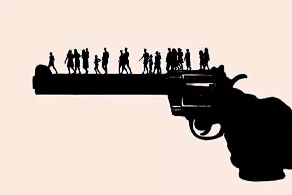In addition to the lack of money for startups (although this is also an important reason), a more important reason is that these features did not help Didi achieve rapid growth at the time.
why?
Jiangnan Bieyuan tells everyone! Whether it is life or personal growth, subtraction is equally important. Mencius said as early as thousands of years ago: "People can do something, and then they can do something." It means that people at a certain stage must know what they can't do, so that they can do more important things. .
Until now, this kind of thinking is called: strategic abandonment .
for example:
When the ride-hailing app first emerged, the user experience was very poor. Taking Didi as an example (it was not called Didi Chuxing at the time), the first version of the app was said to be outsourced. It only has the simplest taxi function, and it is also a taxi.

In addition to the most basic car calling function, the App's appearance design, user experience, car reservation function, etc., these are not considered.
People who know the background at that time should remember that the car-hailing battle was in full swing, and the entire industry was burning money to subsidize the market to seize users. At that time, there was almost no money for taxis, and sometimes money was even posted to users.
What is the business logic behind this?
Use capital to simply and violently evict competitors and take first place in the market. When there is only one company left in the industry at the end, go back and improve the user experience, do a good job in customer service, and optimize product design.
If we review the case of Didi, we will find that there is a very clear business idea in it.
In the early days of entrepreneurship, Didi ’s only core goal was to live. How to guarantee to survive? The most effective way is to seize as much of the initial market share as possible, maintain the rapid growth of users, so as to be able to continue financing and ensure continuous cash flow.
No one will use a taxi app because it looks good. There is only one fundamental appeal for people to use this type of Internet service App, that is, there are enough service providers on it. This condition is not established, everything else is arrogant. This is the cornerstone that supports it from 0 to 1. This is true for taxis, takeaways, and hotel reservations.
To this end, Didi spent a lot of manpower and material resources to do ground push activities. At that time, the CEO of Didi personally took people to the taxi to talk to the driver one by one at the train station, teaching the driver how to use the App. On the Internet, Didi continues to attract new users to register through high subsidies, and at the same time launch dazzling marketing activities to send subsidies and warmth.
In this process, we can see a clear goal prioritization. Under the first goal of grabbing market share, other goals such as App usage experience and rich car-hailing features are actually suspended or even abandoned.
In order to achieve the most fundamental goal, the act of abandoning or sacrificing something is called "strategic abandonment".
It is a strategic thinking that accompanies the law of development of things.
The core of strategic abandonment lies in concentrating limited resources and conquering the most important goal. For this reason, all other unimportant goals can be set aside and ignored.
And its advantages are obvious. When all your energy is focused on one goal, you can focus more on solving a few but important issues without being distracted or caught in a multi-party situation. Only in this way can we achieve high-speed growth.
The reason for "giving up" is to better "acquire". This is an efficient way of thinking.

This "abandonment" is called "strategic abandonment" because it does not give up blindly, but has strategic thinking in it.
Strategic abandonment must be based on the stage of development of things. Whether it is an enterprise, a product or an individual, it is necessary to know where they are currently.
For example, there are entrepreneurial period, development period, stable period, transition period ...
For example, products, there are beta, 1.0, 2.0, 3.0 ...
For example, personal career development can be divided into workplace white, department backbone, company management ...
Each stage must have a fundamental goal to be completed. It is the basic premise of everything. If this goal is not established, all other goals cannot be established.
For example, in an entrepreneurial enterprise, the fundamental goal is to survive, pay employees' wages, and have a steady increase in users. If you ca n’t survive, do n’t talk about expanding and changing the world. So don't do things in a stable period at this time, for example, invest a small amount of resources to do a series of new product development.
Another example is a newcomer who has just graduated from work. The fundamental goal is to improve his professional work ability. This is the basic magic weapon for walking the workplace. If you can't even do the work at hand, don't want to meet any big-time people and socialize all day long.
In short, only by figuring out what stage you are in can you find the fundamental goal, and then you know what you should give up and what you should stick to.
In many cases, the heart is confused and tangled because the fundamental goal is not clear enough, and it will change every once in a while, of course it will cost a lot of useless work.
Remember, there is only one fundamental goal.

"Strategic abandonment" can help us achieve growth at the speed of light, but sometimes it is a slightly "cruel" way of thinking. Because the person or thing that is abandoned, there must be consideration based on the sunk cost, resulting in intense thinking Conflict and confrontation are ultimately difficult to decide.
But if you don't give up, it will definitely affect the progress of the big goal, and even cause yourself to be destroyed.
A more well-known example is the story of Zhuge Liang tearing tears at the horse during the Three Kingdoms period. As a few people who have high hopes from Zhuge Liang, Ma Yun has lost his strategic location in the pavilion because he was just stunned. This puts the entire Shu Kingdom in danger of being destroyed. In order to "appease the army's heart and continue to fight against the enemy" as the fundamental goal, Zhuge Liang shed tears and cut off the general he was once optimistic about, ready to support.
This shows that "strategic abandonment" is not quite the same as the way of thinking in the past. Although it is also an efficient logical thinking, the biggest obstacle to its realization is human feelings.
The contradiction between reason and sentiment is particularly prominent at this time, and how to make decisions at this time is a worthy study.
This is very common in business operations.
For example, when a company is facing a major business transformation, whether to sell European-style furniture or to sell new Chinese-style furniture , employees in the past department could not keep up with the pace of development. But they have worked for the company for many years and are loyal. If you are the CEO, will you eventually leave them or give up decisively?
This decision seems to be a simple choice, but it is accompanied by great pain and consideration. It is necessary to consider not only the mutual sawing of various internal interest groups, but also the fierce evolution of the external competitive environment. Either way, it ’s worth considering carefully.
As another example, when you reach the bottleneck of your career, you find that the skills you learned in the past have not adapted to the development of new trends. At this time, do you stick to the end, or give up the experience and skills accumulated in the past and start from scratch?
Many times, change will inevitably bring pain. The big reason for this "labor pain" is because of the need to "give up." But if the abandonment is not decisive and thorough, the consequences will be unbearable. Therefore, there will be "strong men's broken wrists" and "lost cars to keep handsome".
The biggest difficulty with strategic abandonment is not whether you should give up, but which one you should give up.
And the person who can finally make the correct "abandonment" decision must have the talent of a general. Whether in politics or military, or in corporate development or personal growth, such people are not destined to be mediocre.
More information on the home furnishing industry is on GO Jiaju!
Suzhou Furniture, Wenzhou Furniture, Shanghai Furniture
SHAOXING ZHENGHONG AUTO PARTS CO.LTD , https://www.kontinental-bearing.com